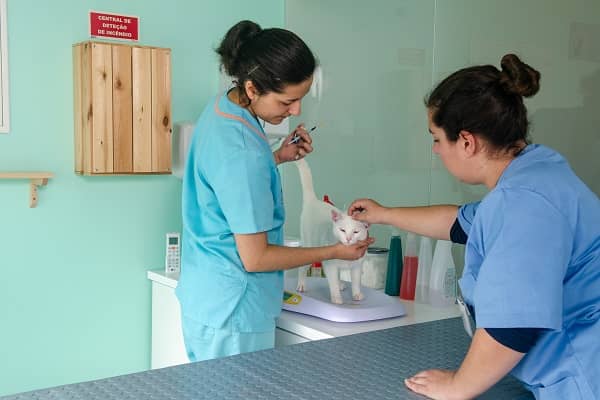Is being a vet tech worth it? If you love animals and aren’t interested in working the traditional 9-5, then yes!
Though the job is deeply rewarding, those working in the field will attest to the demands it also introduces. Technicians must demonstrate the skills, patience, and understanding needed to tend to animals and pet owners alike.
Veterinary medicine can also present certain hazards, from agitated animals to long hours and more. Read on below to learn more about life as a registered veterinary technician.
Table of Contents
What Do Veterinary Technicians Do?
-
Click here for info on becoming a Vet Tech. Apply today!
Loading…
/**/

Vet techs offer a range of nursing care to animals under the guidance and direction of the veterinarians they work with. This ranges from routine wellness checks and examinations to surgical procedures and the associated aftercare.
While responsibilities may vary from clinic to clinic and state to state, day-to-day responsibilities range from dental treatments and lab tests, obtaining and testing blood, stool, and other needed samples, and taking x-rays.
It may be required that they observe an animal’s behavior and condition, ensuring you clearly document and maintain records on the animal.
As techs regularly interact with pet owners to obtain information on all incoming patients visiting the hospital, communication skills are important to maintain. Technicians must also communicate treatment plans to owners, educating them on following the treatment plan back at home.
Additional responsibilities may include:
- prepare animals for surgery
- administer anesthesia and other medications
- monitor vital signs
- assist during procedures
- deliver post-surgical care
- administer vaccines
Top Benefits of Being a Vet Tech
The benefits of being a vet tech are many. Animal lovers everywhere will envy their interaction with such a wide range of species. Far from the typical office environment, vet techs enjoy hands-on exchanges with their patients every day, feeding, petting, grooming, and more.
According to the Bureau of Labor Statistics (BLS), employment among veterinary technicians is projected to increase by 15 percent over the next ten years. That’s a much faster rate of growth than applied to other professions. Each year, we can expect to see over 10,000 new jobs for vet techs hit the market.
Working at a clinic or animal hospital also offers immense opportunities for growth. The National Association of Veterinary Technicians in America recognizes 11 specialty certification areas, and these credentials put technicians in a great position regarding promotions and pay raises.
Working in such close proximity with veterinarians can also lead to opportunities to attend a veterinary school to become a doctor of veterinary medicine at the same clinic they started with.
What is it About Being a Veterinary Technician That Makes the Job so Hard?
While working to improve and maintain animal health is a hugely rewarding experience, it doesn’t come without a certain amount of drawbacks. After all, not all animals can be saved, and delivering bad news to owners can be incredibly taxing. The inconveniences don’t end there, either.
Long Hours and Risk of Injury
Though most vet techs appreciate working outside of the traditional 9-5, the reality is that they often put in much longer than those eight hours. Hospitals and emergency clinics do not abide by regular office hours.
More often than not, vet techs will find themselves working late nights, weekends, and holidays. With that, it’s essential technicians work hard to maintain a healthy work-life balance.
Dogs and cats can also be aggressive when introduced to an unfamiliar environment. It’s not uncommon for technicians to get scratched, kicked, or bit when admitting new patients. They may even be called on to restrain particularly unruly animals.
At the end of the day, it’s a stressful job. Losing a patient or seeing a sick animal brought in due to abuse or neglect can be emotional. It’s not easy to see anything suffer, much less so our innocent furry friends.
Is Becoming a Vet Tech a Good Career?

Becoming a licensed veterinary technician is absolutely a good way to make a respectable living. Read on to learn more about how to prepare for a career in the field.
Can You Make a Living as a Vet Tech?
According to the BLS, the median annual wage for veterinary technicians hovers just over $37,00 a year, with an average hourly wage of $17.43. Of course, salaries will vary according to education, experience, and location. The organization reports that the top ten percent of earners pocket over $52,000 annually.
Texas offers the highest level of employment for veterinary technicians within the country, while Vermont boasts the highest concentration of jobs. The District of Columbia, Connecticut, and Nevada remain the top paying states for veterinary technologists and technicians.
Job Security and Opportunities
According to an ASPCA survey, over 23 million Americans acquired pets during the pandemic. That’s a pretty sizable number for animal care providers to tackle.
As stresses on society continue to pile up, individuals will likely continue leaning on furry companions to help them get through tough times.
Even if you fall out of love with your responsibilities as a technician, there are other growth opportunities. Supervisor roles are available, as well as more advanced positions. Though they may require some additional schooling and credentials, the following opportunities remain common career moves for veterinary technicians:
- Certified Veterinary Pain Practitioner (CVPP)
- Technician Specialist
- Registered Veterinary Nurse
- Community Outreach
- Teaching Opportunities
- Veterinary Nutrition
- Laboratory Research
How to Become a Vet Tech
The first step to becoming a veterinary technician is getting into a good vet tech school. Armed with a high school diploma, aspiring vet techs can apply for certification or degree programs, which typically take around 18 months to complete.
The New England Institute of Technology offers an Associate Degree in Veterinary Technology where students will enjoy hands-on laboratory and clinical experience. Classroom learning will also be provided to ensure students walk away from the program with the skills and knowledge needed to work as entry-level veterinary technicians.
Find out how you can earn your degree in less than 2 years
18
ONLY
months





Graduates can also continue their education with a Bachelor’s Degree in Veterinary Technology. This vet tech program provides students with a deeper understanding of topics introduced at the associate level. It will also help prepare them for specialty areas, including internal medicine, anesthesia, critical care, and dentistry.
Both veterinary technology programs are fully accredited by the American Veterinary Medical Association (AVMA).
After vet school, individuals should prepare to sit for the Veterinary Technician National Examination or the VTNE. The test, which is offered by the American Association of Veterinary State Boards (AAVSB), is a typical requirement to become a licensed vet tech in most U.S. states. It’s also a necessary step to land most available vet tech positions.
Finally, you’ll need to apply for state credentialing. This involves submitting school transcripts and paying an application fee. Other requirements may involve providing proof of American citizenship, passport photos, and a background check. This process will also need to be renewed in accordance with local regulations.
Begin Your Career in Veterinary Medicine Today

Reach out today to begin your journey as a veterinary technician. Though there are bound to be some difficult days ahead, you can rest easy knowing you’ll be making a difference in the lives of both animal and owner.
Whether you find work in a veterinary office, animal hospital, laboratory, or humane society, there are plenty of opportunities for individuals to pursue a career as a vet tech. Just be sure to invest in a pair of comfortable sneakers before you dive in.
Find out how you can earn your degree in less than 2 years
18
ONLY
months





FAQ
Is it better to be a vet tech or a vet?
Deciding whether to become a vet tech or a vet depends on a few different factors. If you want to begin work quickly, then becoming a vet tech is the more suitable option. Vet tech programs are widely affordable and can be completed in just 18 months.
Meanwhile, becoming a veterinarian takes much more time. These individuals must complete a four-year degree program before applying to vet school, where they will earn a doctor of veterinary medicine or DVM.
That said, the payoff may be worth it. According to the Bureau of Labor Statistics, veterinarians earn over $99,000 per year, with the top ten percent of earners making well over six figures.
Is it worth it becoming a vet tech?
Becoming a vet tech is certainly worth it for individuals who want to work with animals and outside of an office environment. To date, the career is experiencing tremendous growth, with about 10,000 new jobs hitting the market each year. The field also provides plenty of job security and room for growth.
Does a vet make more than a vet tech?
Due to their advanced skills and knowledge, it’s not uncommon for vets to make six-figure salaries, and that’s a significantly higher number than vet techs can expect to earn. According to the BLS, technicians typically make around $36,000 annually.

